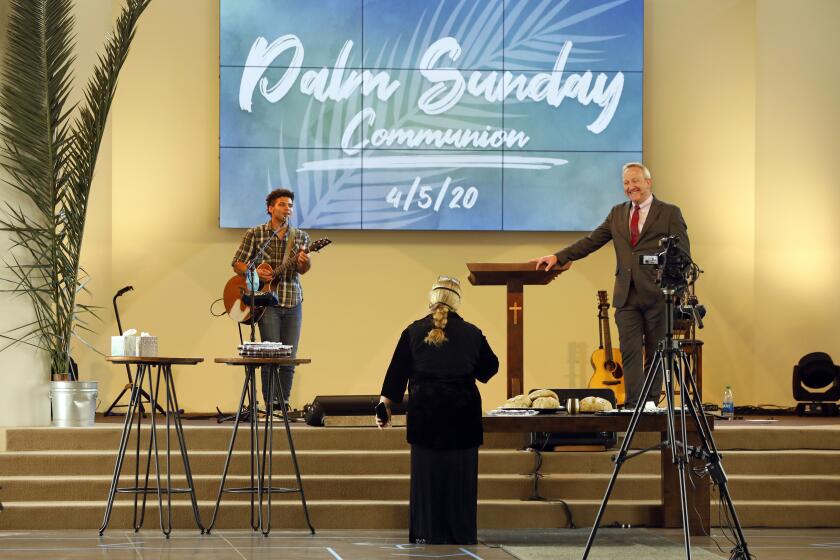Ken Williams, Feisty D.A., Judge, Dies at 91
Rarely has a political figure so irreverent been so revered as Ken Williams, who reigned over the courthouse in the early 1960s as Orange County’s district attorney.
Williams, who later served 22 years as a Superior Court judge in Orange County, died Saturday at age 91.
“It was a magnificent irreverence,” said James G. Enright, a Williams protege who joined the district attorney’s office in 1960. “He was the Will Rogers of the legal profession, but with Voltaire’s sense of justice and injustice.”
Williams operated in a freewheeling style that would horrify many attorneys today. Judges then, Enright said, would think nothing of going over a young prosecutor’s head--and the poor defense attorney’s--to call Williams on the telephone to get an assessment of a case.
Edgar Freeman, who later went to work for Williams, said he first met the district attorney when he was a public defender and talked to clients at the jail at 5 a.m., to catch them before breakfast.
“Williams would be there before me,” Freeman recalled. “Kenny would say, ‘I’m talking to some of your guilty clients to try to figure out just how guilty they really are.’ ”
That would lead to a mistrial today. But Freeman said he quickly learned not to question Williams’ motive behind those jail visits: “What it usually meant was Kenny had a problem with the case as it stood and was willing to listen to the other side.”
Former Superior Court Judge Richard Parslow, retired and now living in Arizona, vividly recalled when he was first hired by Williams as a young prosecutor:
*
“All I could see at first was a cloud of blue cigar smoke and the red glow. He asked me why I wanted to be a deputy D.A. and said, ‘Don’t give me any bull about public service; you got mouths to feed at home, right?’ ”
Williams always got 100% turnout at his deputy meetings because he’d hold the paychecks on his desk and hand them out at the end, Parslow recalled. “We all loved working for Kenny.”
And Robert Kneeland, a former district attorney, said it was fun being Williams’ boss too.
“I didn’t really have a chief deputy at first,” said Kneeland, now retired from the Superior Court bench. “But everybody just assumed it was Ken. He was the best lawyer and just sort of took over the job.”
But Williams’ feisty approach to life could also get him into trouble.
He spent much of his early career as an assistant city attorney in Los Angeles. In 1949, Williams was shot in his bed, right after his wife had left for work, by a woman who said she was having an affair with him. He survived chest and arm wounds. Williams said at the time that she was just infatuated with him; she was released when he asked that she not be charged.
But later, Williams testified in court that he joined the district attorney’s office here in 1951 to get away from that same woman in Los Angeles. That testimony came in a lawsuit she brought against him, claiming he assaulted her.
Williams testified: “She kicked me and I kicked her. But we were both wearing tennis shoes.”
Jurors deliberated less than an hour before siding with Williams, 12 to 0.
Williams was hired by Dist. Atty. James Davis, who left for the bench in 1955; Kneeland was appointed to replace him. When Kneeland left for the bench in 1957, he asked the Board of Supervisors to appoint Williams as his replacement.
“We had a lot of good lawyers, but no one like Ken,” Kneeland said. “He just stood out.”
*
Ed Merrilees, another lawyer hired by Williams and now retired, recalled that there was always something interesting going on involving Williams--like the time he was called as a defense witness in a bookie case.
“The bookies were claiming selective prosecution, because Kenny’s own wife was involved in a law wives club raffling off a mink stole. Kenny, always honest, said yes, that was right, and he’d told his wife Elizabeth she was going to get in trouble with the law if she didn’t stop it.”
It was the kind of honesty upon which Williams’ reputation was built.
“He was totally indifferent to political pressure,” Merrilees said.
When Williams was appointed a judge in 1967, he had a momentous decision to make: To whom should he give the nod as his replacement? What he decided set the rule of succession in the district attorney’s office for more than three decades.
Cecil Hicks was his chief deputy, but he was probably a little closer to Enright. It was characteristic of Williams’ sense of fairness, several say now, that he threw his support to Hicks, who was the senior of the two candidates and held the higher position.
Hicks, aware of Williams’ dilemma, appointed Enright as his chief deputy, a position he held until Hicks retired in 1990.
“Ken Williams truly set the agenda for what a district attorney ought to be,” Enright said. “He never saw us as a rubber stamp of the police department. His philosophy was that excessive justice was sometimes injustice.”
Williams’ funeral service is scheduled for 1 p.m. Thursday at Waverly Church, 1700 Fairhaven Ave. in Santa Ana.
Times librarian Lois Stuart contributed to this report.
More to Read
Sign up for Essential California
The most important California stories and recommendations in your inbox every morning.
You may occasionally receive promotional content from the Los Angeles Times.










